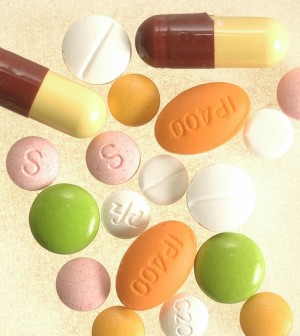- Could Your Grocery Store Meat Be Causing Recurring UTIs?
- Are You Making This Expensive Thermostat Error This Winter?
- Recognizing the Signs of Hypothyroidism
- 10 Strategies to Overcome Insomnia
- Could Artificial Sweeteners Be Aging the Brain Faster?
- Techniques for Soothing Your Nervous System
- Does the Water in Your House Smell Funny? Here’s Why
- Can a Daily Dose of Apple Cider Vinegar Actually Aid Weight Loss?
- 6 Health Beverages That Can Actually Spike Your Blood Sugar
- Treatment Options for Social Anxiety Disorder
Kids With ADHD More Likely to Abuse Drugs: Analysis


Children suffering from attention-deficit/hyperactivity disorder (ADHD) are more than twice as likely to try and abuse drugs, a new analysis finds.
However, that does not mean that the medications that are prescribed to treat the most common childhood disorder in the United States play a part in that increased risk.
In fact, “one of the main points [of the finding] is that treating ADHD both with behavioral techniques and medications seems to lower the risk of substance abuse,” said analysis co-author Dr. Sharon Levy, director of the adolescent substance abuse program at Boston Children’s Hospital.
Although stimulants used to treat ADHD can be addictive, there is no evidence that using them increases the risk of substance abuse, Levy said.
These medications include amphetamines, such as Adderall or Dexedrine, and methylphenidates, like Concerta, Metadate CD or Ritalin.
Levy did caution that these stimulant medications can sometimes be misused. As much as 23 percent of school-aged children are approached to sell, buy or trade their ADHD medications, the researchers noted.
“Pediatricians need to make a careful diagnosis before prescribing and use safe prescribing practices and counseling to minimize diversion and misuse of these drugs,” Levy said.
The analysis of existing medical literature was published online June 30 and in the July print issue of the journal Pediatrics.
Dr. Michael Duchowny, a pediatric neurologist at Miami Children’s Hospital, said, “Children with ADHD need to be counseled about the risk of substance abuse.”
Although the association between ADHD and the risk of substance abuse is known, the reasons for the increased risk aren’t, he said. And while the new study found an association, it did not prove cause-and-effect.
“Obviously, the medications that are used to treat ADHD have the potential for abuse, but the vast majority of children with ADHD do not develop a substance abuse problem,” Duchowny said. “More research has to be done to find out why some children are more susceptible than others.”
It is possible that the same biology that causes ADHD also puts some children at a higher risk for substance abuse, he added.
Other social factors may also contribute to increased risk, the researchers noted.
Among these are that children with ADHD are more likely to struggle in school and turn to drugs to escape anxiety about their difficulties.
Having problems in school may also put these kids with others who have problems and are also at risk for alcohol and drug use, the researchers noted.
“Parents need to be aware that the medications prescribed for ADHD have the potential for abuse. They also have to be aware of the symptoms of substance abuse, and distinguish those from ADHD,” Duchowny said.
“Counseling is important, and awareness is the key to preventing the problems,” he added.
Dr. Robert Dicker is associate director of the division of child and adolescent psychiatry at Zucker Hillside Hospital, in Glen Oaks, N.Y. He said that “special care is needed in treating children who have both ADHD and a substance use disorder. Attention should also be paid to utilizing the stimulant medications with the lowest relative abuse potential or the use of nonstimulant medications.”
In the United States, 8 percent of all children have been diagnosed with ADHD.
More information
Visit the U.S. Institute of Mental Health for more on ADHD.
Source: HealthDay
Copyright © 2026 HealthDay. All rights reserved.










